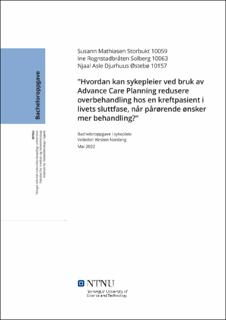| dc.contributor.advisor | Nordang, Kirsten | |
| dc.contributor.author | Storbukt, Susann Mathiasen | |
| dc.contributor.author | Solberg, Ine Rognstadbråten | |
| dc.contributor.author | Østebø, Njaal Asle Djurhuus | |
| dc.date.accessioned | 2022-07-16T17:19:45Z | |
| dc.date.available | 2022-07-16T17:19:45Z | |
| dc.date.issued | 2022 | |
| dc.identifier | no.ntnu:inspera:106262086:112059458 | |
| dc.identifier.uri | https://hdl.handle.net/11250/3006137 | |
| dc.description.abstract | Bakgrunn: Som sykepleier vil man ha nær kontakt med pårørende, som befinner seg i sårbare situasjoner. Døden er noe som angår oss alle, men den kan være utfordrende å akseptere, og krevende å snakke om
Hensikt: Å undersøke om Advance Care Planning kan brukes som kommunikasjonsverktøy, for å kunne redusere overbehandling hos kreftpasienter. Vi ønsker å undersøke om Advance Care Planning kan påvirke pårørendes ønsker om mer behandling til sine nærmeste, når de befinner seg i livets siste fase.
Metode: Et systematisk litteratursøk ble gjennomført i databasene Medline (Ovid), Cinahl (Complete) og Embase. Seks vitenskapelige artikler ble analysert.
Resultat: Resultatanalysen gav tre temaer.
I) Relasjon: Relasjon og tillit mellom pasient, pårørende og helsepersonell er viktig for å få til en åpen og produktiv Advance Care Planning samtale, om hva som venter ved livets sluttfase.
II) Forståelse: Økt forståelse hos pårørende kan skape bevissthet og redusere sannsynligheten for at pårørende ønsker å påvirke behandlingen, som pasienten mottar i livets sluttfase.
III) Hindringer: kompetanse og individuelle tilpasninger. Det identifiseres behov for økt kompetanse og nasjonale retningslinjer for å bryte ned hindringene som oppstår for å utføre en Advance Care Planning samtale.
Konklusjon: I denne litteraturstudien har vi funnet at når en Advance Care Planning intervensjon brukes som en prosess, der det er opparbeidet tillit og en god relasjon mellom pasient, pårørende og sykepleier, vil det føre til en felles forståelse for sykdommen og behandlingen i livets sluttfase. Dette reduserer forekomsten av overbehandling av pasienter i livets sluttfase. Og gir pårørende mindre grunnlag for å ønske mer behandling, der det ikke er hensiktsmessig. Etablering av felles forståelse når pasienten er i en palliativ fase, vil føre til redusert overbehandling av kreftpasienter i livets sluttfase. | |
| dc.description.abstract | Background: As a nurse, you want to have a close contact with relatives and family, who are in vulnerable situations. Death is something that concerns us all, and it can be challenging to accept, and demanding to talk about.
Aim: To investigate whether Advance Care Planning can be used as a communication tool, in order to reduce overtreatment in cancer patients. We want to investigate whether Advance Care Planning can influence relatives’ wishes for more treatment for their loved ones, when they are in the last phase of life.
Method: A systematic literature search was performed in the databases Medline (Ovid), Cinahl (Complete) and Embase. Six scientific articles were analyzed.
Results: The results analysis gave three themes.
I) Relations: Relations and trust between patient, relatives and healthcare professionals are important in order to have an open and productive ACP conversation about what awaits at the end of life.
II) Understanding: Increased understanding among relatives can create awareness and reduce the likelihood that relatives want to influence the treatment, which the patient receives in the end of life.
III) Obstacles, competence and individual adaptions: There is identified a need for increased competence and national guidelines for breaking down the obstacles, that arises for conducting an Advance care planning conversation.
Conclusion: In this literature study, we found that when an Advance Care Planning intervention is used as a process, where trust has been built up and a good relationship is established between patient, relatives and nurse, it will lead to a common understanding of the disease and treatment in the end of life. This reduces the incidence of overtreatment of patients in the end of life. It also gives relatives less grounds to want more treatment, where it’s not appropriate. Establishing a common understanding when the patient is in a palliative phase will lead to reduced overtreatment of cancer patients at the end of life. | |
| dc.language | nob | |
| dc.publisher | NTNU | |
| dc.title | Hvordan kan sykepleier ved bruk av Advance Care Planning redusere overbehandling hos en kreftpasient i livets sluttfase, når pårørende ønsker mer behandling? | |
| dc.type | Bachelor thesis | |
